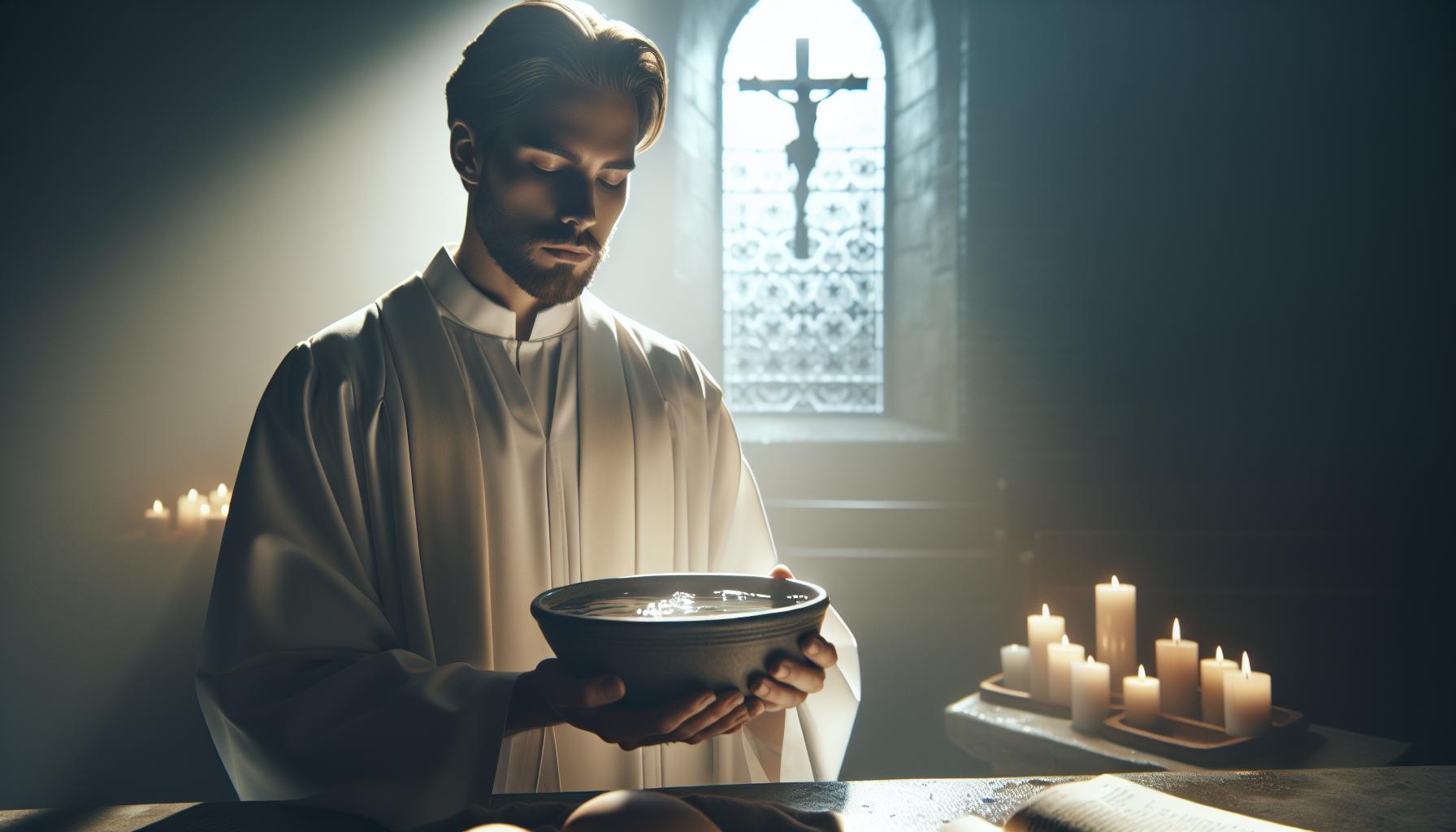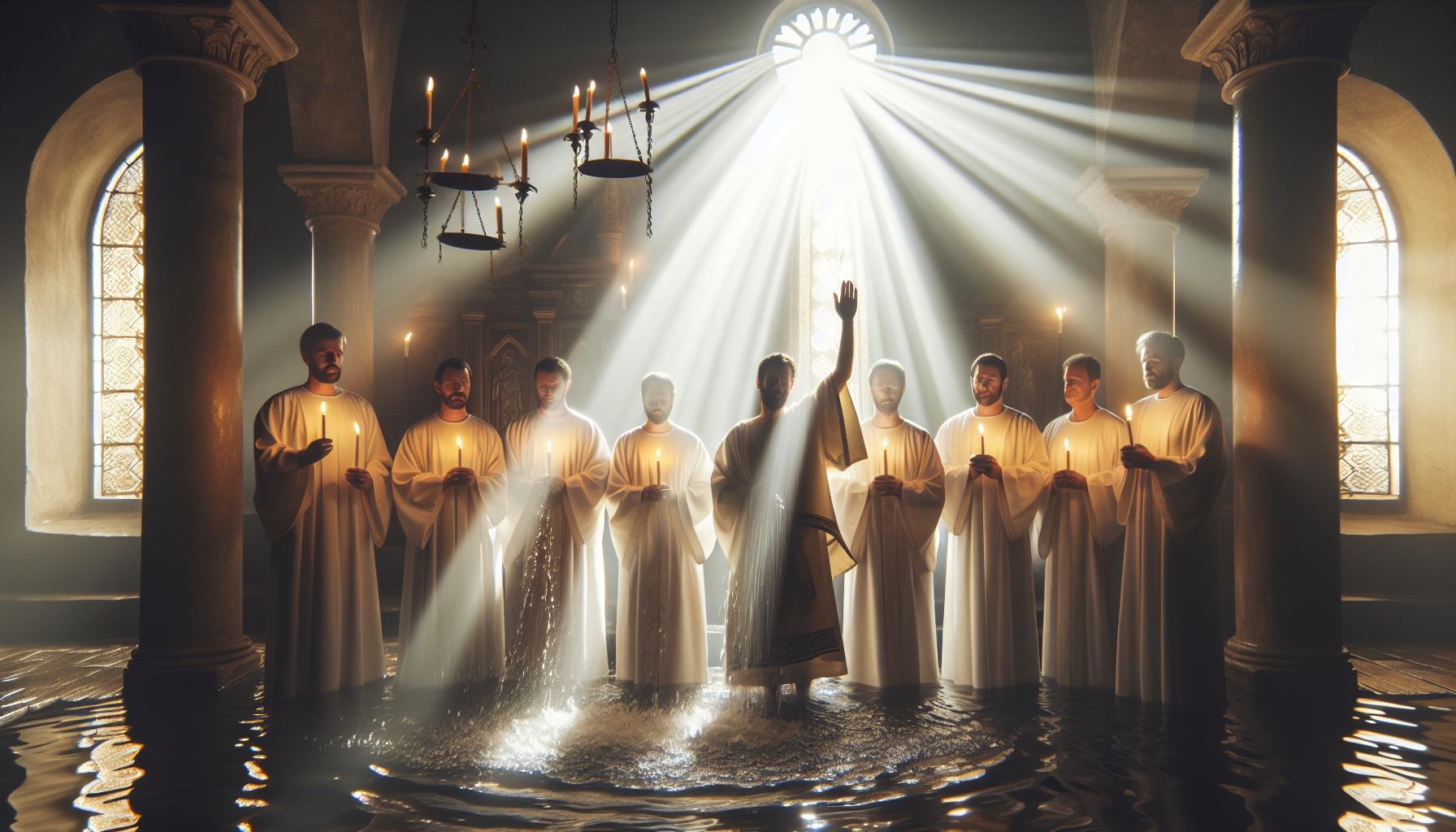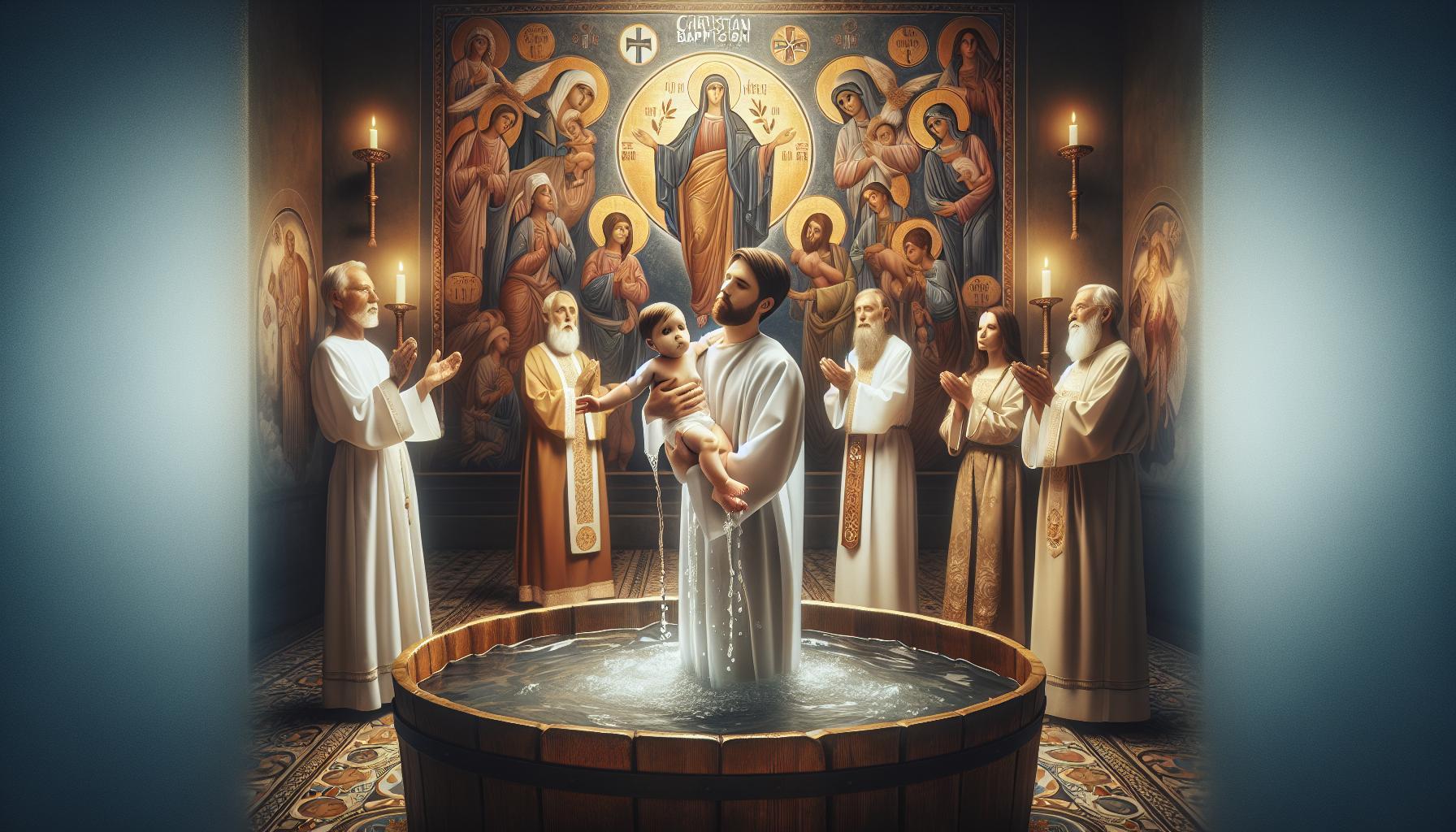What does it truly mean to be baptized in the Christian faith? This rite of passage holds profound significance across various denominations, symbolizing purification and the initiation into a faith community. Understanding the core beliefs and practices surrounding baptism can illuminate its role in spiritual journeys and community identity for millions worldwide.
Understanding the Significance of Baptism in Christianity
The act of baptism is one of the most profound rituals in Christianity, symbolizing a believer’s initiation into the faith and their personal commitment to following Jesus Christ. For many, it represents not just a physical act of cleansing but a spiritual rebirth. Understanding the significance of baptism requires delving into both its theological roots and its historical practices across various Christian denominations.
Theological Importance of Baptism
Baptism serves as a vital sacrament in Christianity, often seen as the means through which individuals publicly declare their faith. According to scripture, Jesus himself was baptized, emphasizing its importance. Here are a few key theological aspects:
- Symbol of Purification: Baptism signifies the washing away of sin, a fresh start in one’s spiritual journey, which is vital for both the individual and the community.
- Covenant with God: For many Christians, baptism is a sign of entering into a covenant relationship with God, akin to the biblical traditions of circumcision in the Old Testament.
- Identification with Christ: The act of immersion or water application represents sharing in the death and resurrection of Jesus, illustrating a believer’s transformative journey.
Historical Context and Variations
Historically, baptism practices have varied significantly among Christian denominations, each attributing different meanings and rituals to the act. Understanding these variations enriches one’s appreciation for the sacrament:
| Denomination | Method of Baptism | Beliefs Associated |
|---|---|---|
| Roman Catholic | Affusion (pouring) or immersion | Infant and adult baptism as a means of grace |
| Baptist | Full immersion | Believer’s baptism, emphasizing personal faith |
| Orthodox | Full immersion thrice | Communal ritual, emphasizing the Holy Spirit |
Understanding these distinctions not only highlights the rich tapestry of Christian belief surrounding baptism but also encourages deeper discussions among various faith communities. This exploration reveals that whether viewed as a rite of passage, an act of obedience, or a personal commitment, baptism remains a cornerstone of Christian identity and faith practice. As individuals contemplate their own paths, engaging with these core beliefs can illuminate the substantial role baptism plays within the broader context of Christian life.
Historical Roots: How Baptism Evolved Through the Ages

The journey of baptism through history is a fascinating narrative that intertwines cultural shifts, theological debates, and the evolving practices of the Christian faith. This sacred ritual, which symbolizes purification and initiation into the Christian community, has transformed remarkably since its inception. Initially, the act of baptism was heavily influenced by ancient Jewish purification rites, but it quickly evolved into a distinct Christian sacrament with rich theological implications.
Early Influences and Biblical Foundations
In the early Christian community, baptism was often linked to the ministry of John the Baptist, who preached repentance and performed baptisms as a sign of spiritual renewal. Jesus himself was baptized, marking a pivotal moment that established the importance of this practice. Following Jesus’ resurrection, the Great Commission outlined in Matthew 28:19-20 encouraged his followers to baptize in the name of the Father, the Son, and the Holy Spirit, solidifying baptism as an essential practice of the early church.
As the church grew, so did the understanding of baptism’s significance. Different interpretations emerged regarding the age for baptism, the method of immersion, and the necessity of faith for valid baptism. These variations led to distinct denominations and practices, broadening the scope of what baptism meant within the Christian tradition.
Medieval to Modern Transformations
As Christianity spread across Europe, baptism became not only a religious ceremony but also a societal and cultural rite. The transition from adult to infant baptism in the early medieval period reflected a growing emphasis on salvation and original sin. This shift is encapsulated in the doctrine of Augustine, which posited that all humans are born with original sin and thus require baptism to enter the Kingdom of God. Consequently, elaborate liturgical baptisms became common, including the use of water and oil, candles, and sponsors, which all added layers of meaning to the ritual.
The Reformation brought about significant changes in the understanding of baptism. Reformers like Martin Luther and John Calvin challenged the established norms of the Catholic Church, advocating for a return to the scriptural basis of baptism. They emphasized baptism as a means of grace and a proclamation of faith rather than a mere ritual. Furthermore, the Anabaptists rejected infant baptism entirely, promoting the practice of believer’s baptism, which asserts that individuals should make a conscious choice to follow Christ before being baptized.
| Era | Key Developments |
|---|---|
| Early Church | Jesus’ baptism and the Great Commission |
| Medieval Period | Shift to infant baptism and ritualistic practices |
| Reformation | Return to biblical principles and emergence of believer’s baptism |
| Modern Day | Diverse interpretations across denominations, including significance of baptism |
Understanding these historical roots provides valuable context for contemporary discussions surrounding baptism. The evolution of this practice highlights the dynamic nature of the Christian faith, where beliefs and rituals adapt while retaining core principles. On an individual level, exploring baptism’s rich historical background can deepen the understanding of its current significance within different Christian communities.
Theological Foundations: What Baptism Represents in Faith

Baptism stands as one of the most profound rites within Christian faith, symbolizing not just a personal commitment but a transformative act of community, grace, and divine purpose. At its core, baptism encapsulates the essence of the believer’s journey—death to sin and rebirth in Christ. It’s an outward expression of an inward faith, bringing with it deep theological implications that resonate throughout Christian doctrine.
Symbolism of Baptism
The act of baptism is rich with symbolism. Several key elements contribute to its significance:
- Water: Often referred to in scripture as a symbol of cleansing, water signifies the washing away of sin. It represents both a literal and spiritual purification.
- Immersion: For many denominations, full immersion in water serves as a potent metaphor for death and resurrection—just as Christ was buried and rose again, so too does the believer emerge from the water renewed.
- Community: Baptism is not merely a personal statement; it is an initiation into the Church community, symbolizing acceptance and belonging among fellow believers.
- Holy Spirit: Many Christians believe that baptism is the moment when the Holy Spirit indwells the believer, marking them as God’s own.
Theological Context
Throughout the New Testament, baptism is presented not just as a ritual but as a commandment of Jesus himself, making it a foundational aspect of the Christian life. In Matthew 28:19-20, often referred to as the Great Commission, Jesus instructs his disciples to baptize all nations in the name of the Father, the Son, and the Holy Spirit. This directive underscores the importance of baptism as a public declaration of faith and an essential part of the process of discipleship.
| Aspect | Significance |
|---|---|
| Initiation | Marks the entry into the Christian community. |
| Obedience | Fulfills the command of Christ to baptize disciples. |
| Identification | Aligns the believer with the death and resurrection of Jesus. |
| Transformation | Represents the believer’s new life in Christ. |
Through understanding these theological foundations, believers can appreciate baptism not merely as a ceremony but as a profound spiritual milestone that signifies their commitment to living a life reflective of Christ’s teachings. In a world that often challenges faith, baptism serves as a steadfast reminder of one’s identity and purpose in the greater narrative of Christian belief.
Common Practices: Different Approaches to Baptism Across Denominations

Baptism holds a significant place across various Christian denominations, serving as a rite of initiation and a profound demonstration of faith. Each tradition has developed its own customs, beliefs, and theological underpinnings surrounding this ancient sacrament. Understanding these diverse approaches not only enriches the appreciation of baptism but also highlights the spectrum of Christian beliefs related to spiritual rebirth and community.
Variations in Baptism Practices
Different denominations across Christianity embrace unique baptismal practices, each grounded in specific theological interpretations. Below are some of the prevalent approaches:
- Infant Baptism: Common in traditions such as Catholicism and many branches of Protestantism, this practice reflects the belief in original sin and the importance of initiating infants into the faith community. For example, in the Catholic Church, infant baptism is viewed as a means of grace, cleansing the child from sin and welcoming them into the Church.
- Believer’s Baptism: This practice, prominent in Baptist and evangelical communities, emphasizes that baptism should only occur after a personal profession of faith. Individuals are often fully immersed in water, symbolizing the death of their old lives and the birth of their new spiritual existence.
- Affusion and Aspersion: In liturgical traditions like the Anglican and Lutheran churches, baptism may involve pouring water over the head (affusion) or sprinkling water (aspersion) rather than full immersion. This method signifies the washing away of sin and the embracing of the Holy Spirit, often accompanied by the signing of the cross.
Theological Underpinnings
The theological significance of baptism also varies between denominations, influencing how practitioners perceive the ritual:
- Sacramental Theology: In Catholicism and Orthodoxy, baptism is considered a sacrament, essential for salvation and a means of receiving God’s grace. These traditions view baptism as a divine action through which believers are spiritually regenerated.
- Covenantal Theology: Many Reformed and Presbyterian denominations understand baptism as a sign of the covenant between God and the faithful, akin to circumcision in the Old Testament. This framing supports their practice of baptizing infants as part of a communal faith.
- Symbolic Gesture: For many evangelical communities, baptism serves primarily as an outward sign of an inward faith—a declaration of personal belief rather than a conduit of divine grace. This perspective often correlates with the practice of believer’s baptism.
Comparative Summary
To illustrate these varying practices and beliefs succinctly, the following table provides a comparative overview:
| Denomination | Baptism Type | Theological View |
|---|---|---|
| Catholicism | Infant Baptism | Sacramental grace and original sin |
| Baptist | Believer’s Baptism | Public profession of faith |
| Anglican | Affusion/Aspersion | Sign of the covenant |
| Orthodox | Infant Baptism | Divine grace and initiation into the Church |
| Presbyterian | Infant Baptism | Covenantal theology |
Each denomination’s distinct approach to baptism reflects deeper theological convictions that shape the broader Christian understanding of faith, community, and divine grace. Whether viewing baptism as essential for salvation or as a public declaration of faith, these varied practices create a rich tapestry of Christian identity and expression.
The Role of the Holy Spirit in the Baptism Experience

In the journey of faith, the baptism experience serves as a pivotal moment for believers, marking a profound connection with the Holy Spirit. This unique relationship is not merely a ceremonial act but a transformative experience that signifies the reception of divine grace and the empowerment to live a Christian life. The Holy Spirit plays an indispensable role in this process, serving as both advocate and guide, drawing individuals into a deeper understanding of their faith and identity within the body of Christ.
Understanding the Holy Spirit’s Presence
At the moment of baptism, the presence of the Holy Spirit is felt as a potent force that unites believers with Christ. This moment mirrors the vital Pentecost event, where the Spirit descended upon the followers of Jesus, marking the birth of the Church. As explained by various sources, the baptism of the Holy Spirit occurs at the moment of conversion, signifying that every believer is filled with the Spirit’s power to live out their faith fully [[1]](https://www.logos.com/grow/min-baptism-of-the-holy-spirit/) [[2]](https://billygraham.org/answers/what-is-the-baptism-of-the-holy-spirit?ri=wc). It is this divine empowerment that allows Christians to experience true unity, as articulated in 1 Corinthians 12:13: “For we were all baptized by one Spirit so as to form one body” [[3]](https://www.crosswalk.com/faith/spiritual-life/how-does-baptism-of-the-holy-spirit-join-me-into-the-body-of-christ.html).
The Role of the Holy Spirit in the Believer’s Life
The Holy Spirit’s influence does not end with baptism; it continues to shape the believer’s daily life, enhancing their spiritual journey with guidance, wisdom, and strength. Through the Spirit, believers receive not only a sense of belonging but also the gifts necessary to serve and build the Church. This ongoing relationship with the Holy Spirit is essential for personal growth in faith and facilitates the process of sanctification—transforming individuals into the likeness of Christ.
Moreover, the Holy Spirit also empowers believers to engage in meaningful practices that reflect their commitment to Christ’s teachings. This includes prayer, worship, and acts of service, which not only strengthen individual faith but also foster community within the Church. These practices are enriched by the Spirit’s guidance, making the experience of faith more profound and impactful.
The sacred act of baptism, therefore, opens the door to a rich spiritual journey where the Holy Spirit plays a fundamental role in nurturing faith. By embracing the Holy Spirit’s transformative power, believers can navigate their Christian walk with confidence, courage, and clarity, fully understanding their identity as members of Christ’s body.
Preparing for Baptism: Guidance for Candidates and Families
Entering into the sacred practice of baptism is a significant milestone in the life of any Christian, marking an important step in one’s faith journey. Understanding the depths of this ceremony can be both thrilling and overwhelming for candidates and their families. Dive into this enriching experience with purpose, preparation, and community support to make the most of this beautiful rite, which symbolizes rebirth and commitment to the Christian faith.
Understanding the Importance of Baptism
Before embarking on the journey of baptism, it’s essential to grasp its significance within Christianity. Baptism is not merely a ritual; it is an outward expression of an inward faith. This holy sacrament represents the cleansing of sins, initiation into the church, and the receiving of the Holy Spirit. As you prepare, take the time to reflect on the personal meaning it holds for you and your family, fostering a deeper appreciation for this important sacrament.
Steps for Candidates Preparing for Baptism
For candidates, the path to baptism often involves specific steps that require commitment and reflection. Here’s a simple guide to navigate this transformative journey:
- Educate Yourself: Learn about the basic tenets of Christianity, the meaning of baptism, and what it entails. This can include studying sacred texts and understanding core beliefs discussed in resources like *What Is Baptism Christian? Core Beliefs and Practices Explained*.
- Participate in Pre-Baptism Classes: Many churches offer preparatory classes. These sessions are designed to discuss the symbolism of baptism, the life of Jesus Christ, and what it means to live as a Christian.
- Engage with Your Community: Connect with your local congregation. Engaging with fellow church members not only enhances your spiritual growth but also creates a support system as you prepare for this milestone.
- Personal Reflection: Spend time in prayer and meditation to explore your faith’s evolution. Journaling your thoughts can also provide clarity during this time.
Guidance for Families
Families play a crucial role during the baptism preparation, often serving as a source of support and example for the candidate. It’s vital for families to understand their part in this process. Encourage open discussions about faith and the importance of living in accordance with Christian values. Here are some ways families can actively engage:
- Host a Family Meeting: Gather family members to discuss the significance of baptism, allowing everyone to express their thoughts and feelings.
- Choose Godparents Thoughtfully: Selecting godparents who embody the Christian faith and can guide the candidate in their spiritual journey is crucial.
- Plan a Celebration: Consider preparing a meal or gathering with friends and family post-baptism to celebrate this joyous occasion, reinforcing the community of faith.
| Preparation Activity | Benefit |
|---|---|
| Pre-Baptism Classes | Provides knowledge about the Christian faith and the meaning of baptism. |
| Family Discussions | Fosters family unity and understanding of the commitment involved in baptism. |
| Community Engagement | Creates a network of support and encouragement from church members. |
Taking these steps will prepare both candidates and families for a meaningful baptism experience rooted in faith and community. By understanding the importance of baptism and engaging fully in the preparation process, candidates will step into the waters of baptism with confidence, supported by their loved ones and the church community.
Embracing Community: The Importance of Congregational Support in Baptism
When a believer undergoes the transformative experience of baptism, it is not merely a personal journey; it integrates them into a broader community of faith. The significance of congregational support during this sacred rite cannot be overstated. In many Christian traditions, baptism symbolizes the individual’s commitment to counter cultural norms and live authentically as an embodiment of Christ’s teachings. Yet, although baptism can be a deeply personal act, it also serves as a public declaration of faith, where the church community plays a vital role.
The Role of Congregation in Baptism
The congregation is not just a passive observer during baptism; they assume an active, supportive role that is essential for both the individual being baptized and the community at large. This collective affirmation creates a sense of belonging and accountability. Here are a few key ways in which congregational support enhances the baptism experience:
- Witnessing the Commitment: The presence of family, friends, and the wider church community serves as a powerful witness to the new believer’s commitment to Christ. Their participation embodies the belief that faith is not lived in isolation.
- Encouragement and Mentorship: New believers often flourish when they receive ongoing support from mentors within the church. Engaging with a community fosters spiritual growth through shared experiences, teachings, and encouragement.
- Prayer and Accountability: The congregation can commit to praying for the newly baptized individual, supporting their journey in faith. Having a network of accountability can help maintain the integrity of the commitment made during baptism.
Building a Lasting Community
The baptism event serves as a catalyst for building long-lasting relationships within the church. This is where new believers can foster connections that enrich their spiritual journey. For many, being part of a faith community means they have access to resources, support, and teachings that help them navigate their walk with Christ. Activities such as Bible study groups, volunteering opportunities, and church events can provide avenues for deeper integration, allowing for friendships to flourish that are focused on shared faith and purpose.
Additionally, churches often encourage congregational members to take part in the baptism and celebration process, which further solidifies the bonds within the community. Through acts of fellowship, like a shared meal or a welcoming service, the church visibly reinforces the idea that no one is alone in their faith journey.
Conclusion
In summary, the interplay between individual baptism and communal support reveals the broader picture of the Christian faith. Engaging with the church community not only enriches the baptism experience but also lays the groundwork for a lifetime of growth, fellowship, and faithfulness. In understanding the essence of baptism and the role of the church, we are reminded that faith, while personal, is ultimately a collective journey towards a deeper relationship with God and one another.
Lifelong Journey: How Baptism Shapes Spiritual Growth and Discipleship
In the tapestry of Christian faith, baptism serves as a profound rite of passage, intricately woven into the fabric of spiritual growth and discipleship. For many believers, this sacred ceremony marks not just an initiation into the community of faith, but also a transformative event igniting a lifelong journey toward spiritual maturity. By understanding what baptism embodies in the Christian tradition, individuals can appreciate how its implications extend far beyond the act itself, fostering a deeper connection to God and a commitment to following Christ.
The Transformative Power of Baptism
Baptism holds multifaceted significance within Christianity, representing not only a personal declaration of faith but also an acknowledgment of belonging to a larger body of believers. For instance, the act of being submerged in water symbolizes cleansing from sin and the start of a new life in Christ. This ritual is steeped in biblical foundation, as seen in passages such as Matthew 28:19, where Jesus commands His followers to baptize all nations. Such imperative emphasizes how baptism is deeply rooted in the Christian identity.
Consider the following transformative aspects of baptism:
- Spiritual Cleansing: Recognized as a means for believers to express repentance and receive forgiveness, baptism signifies the washing away of one’s past and initiation into a new spiritual trajectory.
- Public Declaration: Baptism serves as a testimony of faith, allowing individuals to share their commitment to Christ with family, friends, and the faith community, thereby reinforcing accountability and support.
- Rite of Initiation: As a significant milestone, baptism invites believers into a new family—the church—where they can learn, grow, and be nurtured in their faith journey.
Discipleship: A Lifelong Call
The journey of discipleship begins with the waters of baptism, but it does not end there. It unfolds into a lifelong commitment to grow in faith and understanding. Discipleship involves intentional learning and practicing the teachings of Jesus, which can be seen through various avenues:
- Engagement in Community: Being active in a church community allows believers to develop relationships that foster growth. Whether participating in small groups or serving in ministry, each experience enriches the faith journey.
- Regular Study of Scripture: Delving into the Bible cultivates a deeper understanding of Christian beliefs and practices. Setting aside time each day for personal devotion or participating in group Bible studies can enhance spiritual insight and encourage application in daily life.
- Practicing Prayer and Worship: Regular communication with God through prayer and collective worship rejuvenates the spirit, aligning the heart with God’s intentions and invigorating the believer’s resolve to follow Christ’s teachings.
The Ripple Effect
The impact of baptism shapes not only the individual believer but also ripples outward to affect families, communities, and the church at large. New creations in Christ inspire others and can initiate conversations that lead to further exploration of faith among those who witness the transformation. For believers, the call to discipleship becomes a vibrant, actionable philosophy that influences decisions, relationships, and overall life direction.
As one contemplates the role of baptism in spiritual growth, they begin to unravel its richness, understanding it as a foundational event that seeds a thirst for deeper knowledge and a committed journey of faith. With a supportive community, diligent scriptural exploration, and a profound personal relationship with God, the path of discipleship becomes not just a destination but a thrilling, ongoing adventure.
Faq
What Is Baptism Christian? Core Beliefs and Practices Explained?
Baptism in Christianity is a sacred ritual that symbolizes the initiation of a believer into the Christian faith. It typically involves water and represents the cleansing of sin and the new life in Christ.
Most denominations view baptism as a foundational practice linked to Jesus’ commands and the Great Commission. It serves as an outward sign of an inward change and commitment to following Jesus. Baptism can be performed as infant baptism or believer’s baptism, depending on the tradition.
Why does baptism matter in Christianity?
Baptism signifies a believer’s commitment to their faith and serves as an act of obedience to Jesus’ teachings. It represents a public declaration of faith and a step in the lifelong journey of discipleship.
The importance of baptism varies greatly among Christian denominations. While some see it as essential for salvation, others view it as a significant yet symbolic act of faith. Understanding various perspectives can help deepen one’s appreciation of this sacrament.
How does baptism usually take place?
Baptism typically involves a minister or pastor performing the rite, often using water to cleanse the individual. The ritual may include the laying on of hands, prayer, and the pronouncement of the person’s faith.
Depending on the denomination, baptism can be performed by immersion, pouring, or sprinkling water. For instance, Baptist traditions often emphasize full immersion as a reflection of Jesus’ own baptism, while other denominations may practice different methods.
Can I be baptized more than once?
In Christianity, baptism is generally considered a one-time act symbolizing a person’s acceptance of Christ and the initiation into the faith. However, some traditions allow for re-baptism under specific circumstances.
Situations might include a significant change in understanding of faith or a personal recommitment to the principles of Christianity. It’s essential to engage in discussions with a pastor or spiritual leader to explore the reasons for considering re-baptism.
What are the core beliefs surrounding baptism?
Core beliefs about baptism include its role as a rite of passage, the cleansing of sins, and an act of obedience to Jesus. Many Christians view it as a means of grace and a way to receive the Holy Spirit.
Baptism also connects believers to the larger community of faith, affirming their membership in the body of Christ. For deeper insights into the histories and practices related to baptism, you may want to explore resources on baptism and its significance.
What do different denominations believe about baptism?
Different Christian denominations have varying interpretations of baptism. For some, it is a sacrament essential for salvation, while others see it as a testament to faith.
For example, Catholics practice infant baptism to cleanse original sin, while many Protestants emphasize baptism as an act of personal faith that occurs after one chooses to believe in Christ. Understanding these differences can help foster respect among diverse Christian backgrounds.
Where can I find teachings on baptism?
You can find teachings on baptism within the Bible, particularly in the New Testament. Key passages include Matthew 28:19-20, which details the Great Commission, and Acts 2:38, which discusses the call to repent and be baptized.
Many churches also provide resources, classes, or pastoral guidance to help deepen understanding. Exploring local church websites or speaking with a pastor can offer valuable insights into specific beliefs and practices surrounding baptism.
The Conclusion
In conclusion, understanding the significance of baptism within Christianity is a journey that invites believers into a deeper relationship with their faith. We explored the core beliefs surrounding baptism—from its theological roots as a sacrament of faith to its practical applications in the life of a believer. This sacred ritual not only symbolizes purification and rebirth but also unites us in a shared identity as followers of Christ.
As you reflect on these insights, consider engaging with the tradition in your own context, whether you’re preparing for baptism, supporting someone on their faith journey, or fostering a deeper understanding within your community. We encourage you to explore further, ask questions, and connect with others who share your curiosity. Remember, the journey of faith is enriched through conversation and experience, so feel free to dive deeper into the practices and beliefs that resonate with you. Embrace this beautiful tradition with an open heart, and may your exploration of baptism lead to profound spiritual growth and connection.





